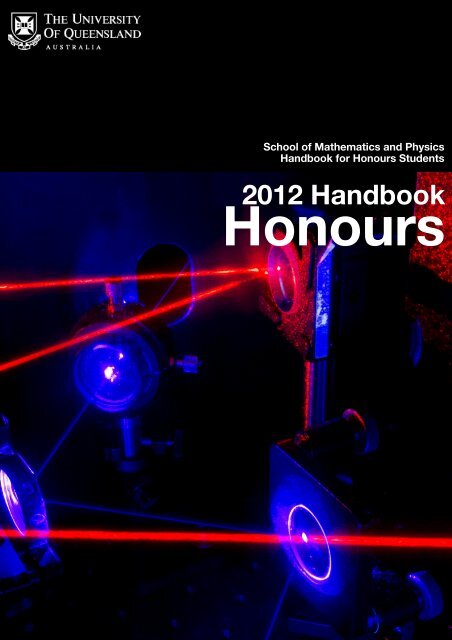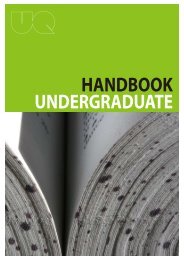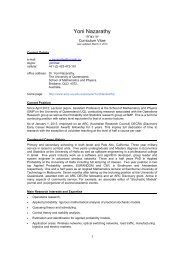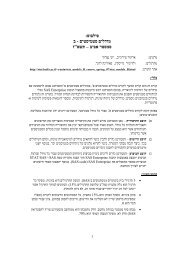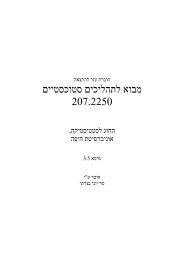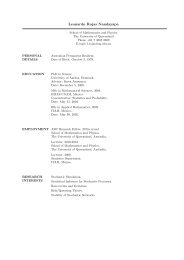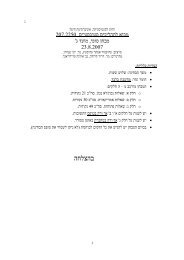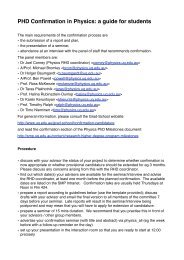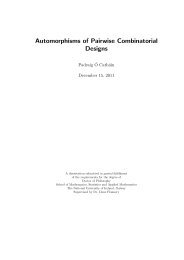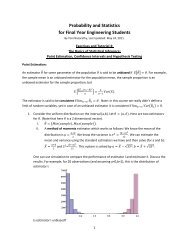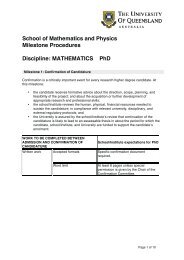2012 Handbook Honours - School of Mathematics and Physics ...
2012 Handbook Honours - School of Mathematics and Physics ...
2012 Handbook Honours - School of Mathematics and Physics ...
Create successful ePaper yourself
Turn your PDF publications into a flip-book with our unique Google optimized e-Paper software.
<strong>School</strong> <strong>of</strong> <strong>Mathematics</strong> <strong>and</strong> <strong>Physics</strong><br />
<strong>H<strong>and</strong>book</strong> for <strong>Honours</strong> Students<br />
<strong>2012</strong> <strong>H<strong>and</strong>book</strong><br />
<strong>Honours</strong>
<strong>Honours</strong><br />
<strong>H<strong>and</strong>book</strong><br />
<strong>2012</strong><br />
<strong>School</strong> <strong>of</strong> <strong>Mathematics</strong> <strong>and</strong> <strong>Physics</strong><br />
The University <strong>of</strong> Queensl<strong>and</strong><br />
Last updated in December 2011
Contents<br />
Important Dates for <strong>2012</strong> .................................................................................. 3<br />
Welcome ............................................................................................................ 5<br />
The <strong>School</strong> <strong>of</strong> <strong>Mathematics</strong> <strong>and</strong> <strong>Physics</strong> ........................................................ 5<br />
<strong>School</strong> Locations <strong>and</strong> Members <strong>of</strong> Staff............................................................... 6<br />
Discipline Locations ................................................................................................ 7<br />
Admission Requirements ................................................................................. 8<br />
Application Process ................................................................................................ 8<br />
An <strong>Honours</strong> Degree........................................................................................... 8<br />
The <strong>Honours</strong> Thesis ............................................................................................... 8<br />
Your <strong>Honours</strong> Supervisor .................................................................................... 11<br />
Your <strong>Honours</strong> Coordinators ................................................................................. 13<br />
Administration, Equipment <strong>and</strong> Facilities ........................................................... 13<br />
<strong>Mathematics</strong> .................................................................................................... 15<br />
<strong>Mathematics</strong> <strong>Honours</strong> Program .......................................................................... 15<br />
Statistics <strong>Honours</strong> Program ................................................................................. 15<br />
Level <strong>of</strong> <strong>Honours</strong> ................................................................................................. 166<br />
Laboratories <strong>and</strong> Equipment ............................................................................... 17<br />
<strong>Honours</strong> Coordinator ............................................................................................ 17<br />
<strong>Physics</strong> ............................................................................................................. 18<br />
<strong>Physics</strong> <strong>Honours</strong> Program ................................................................................... 18<br />
Level <strong>of</strong> <strong>Honours</strong> ................................................................................................... 18<br />
Laboratories <strong>and</strong> Equipment ............................................................................... 20<br />
<strong>Honours</strong> Coordinator ............................................................................................ 20<br />
Page 2
Important Dates for <strong>2012</strong><br />
First Semester<br />
Students may commence work<br />
on their project from this date<br />
Orientation Week<br />
Classes<br />
Mid-semester break<br />
Classes<br />
Revision period<br />
Examination period<br />
Semester ends<br />
Monday 6 February<br />
Monday 20 February - Friday 24 February<br />
Monday 27 February - Thursday 5 April<br />
Monday 9 April - Friday 13 April<br />
Monday 16 April - Saturday 2 June<br />
Sunday 3 June - Friday 8 June<br />
Saturday 9 June - Saturday 23 June<br />
Saturday 23 June<br />
Second Semester<br />
Orientation Week<br />
Classes<br />
Mid-semester break<br />
Classes<br />
Revision period<br />
Examination period<br />
Semester ends<br />
Monday 16 July - Friday 20 July<br />
Monday 23 July - Saturday 22 September<br />
Monday 24 September - Friday 28 September<br />
Monday 1 October - Saturday 27 October<br />
Sunday 28 October - Friday 2 November<br />
Saturday 3 November - Saturday 17 November<br />
Saturday 17 November<br />
Summer Semester<br />
Classes Monday 26 Nov - Saturday 9 Feb 2013<br />
Public Holidays<br />
New Year’s Day – Public Holiday<br />
Australia Day<br />
Good Friday<br />
Easter Monday<br />
Anzac Day<br />
Labour Day<br />
Queen’s Diamond Jubilee<br />
Exhibition Day<br />
Queen's Birthday<br />
Christmas Day - Public Holiday<br />
Boxing Day - Public Holiday<br />
Monday 2 January<br />
Thursday 26 January<br />
Friday 6 April<br />
Monday 9 April<br />
Wednesday 25 April<br />
Monday 7 May<br />
Monday 11 June<br />
Wednesday 15 August<br />
Monday 1 October<br />
Tuesday 25 December<br />
Wednesday 26 December<br />
Page 3
The information provided in this h<strong>and</strong>book supplements, but does not replace the<br />
information on rules <strong>and</strong> procedures published in the <strong>of</strong>ficial <strong>2012</strong> Program <strong>and</strong><br />
Course Information CD. The myAdvisor website contains information on the<br />
University’s academic policies <strong>and</strong> procedures www.uq.edu.au/myAdvisor. The<br />
<strong>of</strong>ficial rules <strong>and</strong> procedures are also contained on the UQ website. Students are<br />
expected to familiarise themselves with these.<br />
Full descriptions <strong>of</strong> courses are available on the Courses <strong>and</strong> Programs website<br />
www.uq.edu.au/study. As policies are amended, this website is updated.<br />
Whilst all due care has been taken in compiling this publication, any conflict<br />
between the information provided in this h<strong>and</strong>book <strong>and</strong> the information provided<br />
in <strong>of</strong>ficial University <strong>of</strong> Queensl<strong>and</strong> publications, the latter will take precedence.<br />
Page 4
Welcome<br />
Welcome to your <strong>Honours</strong> year in the <strong>School</strong> <strong>of</strong> <strong>Mathematics</strong> <strong>and</strong> <strong>Physics</strong>. We<br />
hope that you will find your studies in the <strong>School</strong> challenging <strong>and</strong> rewarding. This<br />
h<strong>and</strong>book has been written to provide information for prospective <strong>and</strong> current<br />
<strong>Honours</strong> students undertaking <strong>Honours</strong> in the <strong>School</strong> <strong>of</strong> <strong>Mathematics</strong> <strong>and</strong><br />
<strong>Physics</strong>.<br />
This h<strong>and</strong>book has several purposes:<br />
• it explains the structure <strong>of</strong> programs within the <strong>School</strong>;<br />
• it identifies key members within each Discipline; <strong>and</strong><br />
• it advises you on whom to see if you have any difficulties.<br />
The <strong>Honours</strong> program is a transitional degree from undergraduate to<br />
postgraduate studies. The <strong>Honours</strong> year is a crucial year in higher education,<br />
opening up many career options not available to pass graduates. An <strong>Honours</strong><br />
degree is tangible pro<strong>of</strong> <strong>of</strong> your capacity for sustained independent work at a<br />
high level.<br />
The benefits <strong>of</strong> undertaking an <strong>Honours</strong> year include:<br />
• the opportunity to pursue further study in one specialist area in more<br />
depth than is possible with a pass degree;<br />
• developing <strong>and</strong> enhancing research skills relevant to your area <strong>of</strong><br />
specialisation;<br />
• developing a base <strong>of</strong> knowledge <strong>and</strong> technical skills sufficient for<br />
enrolment in postgraduate research degrees, or for a specialist career;<br />
• entry leading to an academic career;<br />
• entry leading to a pr<strong>of</strong>essional career where higher level research<br />
skills are required;<br />
• facilitating progression to PhD for students attaining <strong>Honours</strong> Class I or<br />
IIA.<br />
<strong>Honours</strong> <strong>and</strong> Postgraduate students are held in high regard throughout the<br />
<strong>School</strong> as they impart knowledge <strong>and</strong> contribute to the rich array <strong>of</strong> events,<br />
research, tutoring <strong>and</strong> general life within the <strong>School</strong>. Many <strong>Honours</strong> students<br />
have distinguished themselves with University medals <strong>and</strong> awards <strong>and</strong> have<br />
gone on to rewarding careers in a wide variety <strong>of</strong> occupations, with many holding<br />
university appointments here in Australia <strong>and</strong> abroad.<br />
The <strong>Honours</strong> program requires hard work <strong>and</strong> commitment. We hope that you<br />
find the experience to be both rewarding <strong>and</strong> enjoyable.<br />
Page 5
The <strong>School</strong> <strong>of</strong> <strong>Mathematics</strong> <strong>and</strong> <strong>Physics</strong><br />
The <strong>School</strong> <strong>of</strong> <strong>Mathematics</strong> <strong>and</strong> <strong>Physics</strong> comprises the disciplines <strong>of</strong><br />
<strong>Mathematics</strong> <strong>and</strong> <strong>Physics</strong>, <strong>and</strong> is responsible for managing the related<br />
academic programs. The <strong>School</strong> highly regards present <strong>Honours</strong> students <strong>and</strong><br />
encourages enrolments from within undergraduate programs whilst also<br />
welcoming students from outside the University.<br />
The academic staff supervising <strong>Honours</strong> students are involved in many areas <strong>of</strong><br />
fundamental <strong>and</strong> applied research. The <strong>School</strong> supports a strong research<br />
interaction with many other university schools <strong>and</strong> research centres, plus <strong>of</strong>fcampus<br />
organisations <strong>and</strong> industries.<br />
<strong>School</strong> Locations <strong>and</strong> Members <strong>of</strong> Staff<br />
Finance Office: Ground Level, <strong>Physics</strong> Annexe (6).<br />
Student Administration Office: Level 3, Priestley Building (67).<br />
Telephone: +61 (0) 7 3365 2673<br />
Facsimile: +61 (0) 7 3365 3328<br />
Email: student@smp.uq.edu.au<br />
Office Hours: Mon–Fri: 8.30am–4.30pm<br />
Mailing Address:<br />
<strong>School</strong> <strong>of</strong> <strong>Mathematics</strong> <strong>and</strong> <strong>Physics</strong><br />
The University <strong>of</strong> Queensl<strong>and</strong><br />
St Lucia Queensl<strong>and</strong> 4072<br />
AUSTRALIA<br />
Web Page: www.smp.uq.edu.au<br />
Head <strong>of</strong> <strong>School</strong> - Pr<strong>of</strong>essor <strong>of</strong> <strong>Physics</strong><br />
Pr<strong>of</strong>essor Halina Rubinsztein-Dunlop<br />
Telephone: +61 (0) 7 3365 3405<br />
Email: halina@physics.uq.edu.au<br />
<strong>School</strong> Manager<br />
Chris Shannon<br />
Telephone: +61 (0) 7 3365 3272<br />
Email: chris.shannon@uq.edu.au<br />
Page 6
Student Administration<br />
Cath Carkeet<br />
Student Administration Manager<br />
Telephone: +61 (0) 7 3365 6065<br />
Email: c.carkeet@smp.uq.edu.au<br />
Marie Grove<br />
Student Administration Officer<br />
Telephone: +61 (0) 7 3365 2673<br />
Email: m.grove@smp.uq.edu.au<br />
Murray Kane<br />
Student Administration Officer<br />
Telephone: +61 (0) 7 3346 7264<br />
Email: m.kane1@uq.edu.au<br />
Finance<br />
Linda Schumacher<br />
Finance Manager<br />
Telephone: +61 (0) 7 3365 2151<br />
Email: lms@smp.uq.edu.au<br />
Customer Service Manager<br />
Karl Blakeney (Room 67-545)<br />
Telephone: +61 (0) 7 3365 3254<br />
Email: science.it@uq.edu.au<br />
Personnel<br />
Poonam Kalwar<br />
Finance & Human Resource Officer<br />
Telephone: +61 (0) 7 3346 9532<br />
Email: p.kalwar@uq.edu.au<br />
Discipline Locations<br />
<strong>Mathematics</strong><br />
Located in the Priestley Building (67)<br />
<strong>Honours</strong> Coordinator: Dr Victor<br />
Scharaschkin<br />
(victors@maths.uq.edu.au)<br />
Secretary: Ms Kathy Lyons<br />
Phone: +61 (0) 7 3365 3277<br />
Fax: +61 (0) 7 3365 1477<br />
Email: k.lyons@uq.edu.au<br />
Administration Officer: Ms Kay<br />
Mackie Phone: +61 (0) 7 3365 3278<br />
Fax: +61 (0) 7 3365 1477<br />
Email: k.mackie@uq.edu.au<br />
<strong>Physics</strong><br />
Located in the <strong>Physics</strong> Annexe<br />
(Building 6)<br />
<strong>Honours</strong> Coordinator: Dr Ian McCulloch<br />
(ianmcc@physics.uq.edu.au)<br />
Secretary: Mrs Jennifer Robinson<br />
Phone: +61 (0) 7 3365 3424<br />
Fax: +61 (0) 7 3365 1242<br />
Email: robinson@physics.uq.edu.au<br />
Communications, Marketing <strong>and</strong><br />
Outreach<br />
Aarti Kapoor<br />
Communications <strong>and</strong> Marketing<br />
Officer<br />
Telephone: +61 (0) 7 3346 9935<br />
Email: a.kapoor@uq.edu.au<br />
Andrew Stephenson<br />
Science Communicator<br />
Telephone: +61 (0) 7 3346 7964<br />
Email: a.stephenson@uq.edu.au<br />
Page 7
Admission Requirements<br />
Admission to <strong>Honours</strong> is open to students who demonstrate superior<br />
achievement in their undergraduate studies. To be eligible, a student should<br />
hold:<br />
• a Bachelor <strong>of</strong> Science degree or an award recognised by the<br />
Executive Dean as equivalent, <strong>and</strong>;<br />
• a GPA <strong>of</strong> at least 4.5 over #8 from late-year courses from Part B <strong>of</strong> the<br />
BSc list considered by the Head <strong>of</strong> <strong>School</strong> to be relevant to the<br />
proposed program <strong>of</strong> study.<br />
An <strong>Honours</strong> application must be submitted to the <strong>School</strong> <strong>of</strong> <strong>Mathematics</strong> <strong>and</strong><br />
<strong>Physics</strong> Student Administration Office. All applications for admission to <strong>Honours</strong><br />
require approval by the Head <strong>of</strong> <strong>School</strong>.<br />
Application Process<br />
• Find a supervisor <strong>and</strong> decide on a project area before completing the<br />
form, so you are strongly encouraged to start looking for a supervisor<br />
before the end <strong>of</strong> your third year.<br />
• Complete the <strong>School</strong> <strong>of</strong> <strong>Mathematics</strong> <strong>and</strong> <strong>Physics</strong> <strong>Honours</strong> application<br />
form. This application form is available from<br />
http://smp.uq.edu.au/content/honours-studies.<br />
• This form should be completed after the results for your last semester <strong>of</strong><br />
third year are released. If you are starting <strong>Honours</strong> in second semester, it<br />
is recommended that you submit your application very soon after the<br />
release <strong>of</strong> results.<br />
• Applications should be submitted to the <strong>School</strong> Student Administration<br />
Office. The <strong>School</strong> will notify applicants by email <strong>of</strong> the outcome <strong>of</strong> their<br />
application.<br />
• After you have been advised that you have been admitted, you should<br />
enrol yourself in the courses you wish to study as well as your <strong>Honours</strong><br />
project.<br />
An <strong>Honours</strong> Degree<br />
To be awarded an <strong>Honours</strong> degree, you must complete #16 from your chosen<br />
field in Part H <strong>of</strong> the BSc list, which is made <strong>of</strong> up <strong>of</strong> a thesis <strong>and</strong> coursework.<br />
See the relevant discipline section for more information on how each program is<br />
weighted.<br />
The <strong>Honours</strong> Thesis<br />
The aim <strong>of</strong> the <strong>Honours</strong> thesis is to provide students with the opportunity to carry<br />
out a set piece <strong>of</strong> research in an environment <strong>and</strong> in a way that develops their<br />
research skills. Skills developed include the ability to identify a research<br />
opportunity <strong>and</strong> to define <strong>and</strong> refine a research question, to demonstrate how the<br />
question is related to existing knowledge, to identify the research tools needed to<br />
investigate the question, to prosecute the research <strong>and</strong> to analyse <strong>and</strong> write-up<br />
the results in appropriate language in a coherent, logically structured report.<br />
Page 8
Your <strong>Honours</strong> Thesis will consume a large fraction <strong>of</strong> the available time for the<br />
full academic year. A typed thesis must be submitted at the end <strong>of</strong> two full<br />
semesters <strong>and</strong> assessment will be on the basis <strong>of</strong> this thesis, a brief seminar on<br />
the thesis topic <strong>and</strong> an oral examination on the thesis material, as well as the<br />
judgment <strong>of</strong> the project supervisor. Projects are restricted to problems on which<br />
one or more staff members have the expertise <strong>and</strong> interest necessary to give<br />
detailed supervision <strong>and</strong> for which facilities are immediately available. In practice<br />
this means that the projects are closely tied to the on-going research in the<br />
discipline. A list <strong>of</strong> projects can be obtained from the relevant <strong>Honours</strong><br />
Coordinator. This is not necessarily an exclusive list; intending <strong>Honours</strong> students<br />
may wish to suggest different projects or approach staff members not listed as<br />
project supervisors.<br />
Such suggestions can be accepted only when we are satisfied that they will lead<br />
to viable projects. You can find information about research currently happening<br />
in the <strong>School</strong> by visiting our website at www.smp.uq.edu.au <strong>and</strong> clicking on the<br />
Research link.<br />
Once a project has been assigned, the student is expected to consult widely <strong>and</strong><br />
regularly with his/her supervisor so that satisfactory progress occurs. Early in the<br />
project students should develop a plan, in consultation with their supervisor, for<br />
the progression <strong>of</strong> work that might need to be carried out by the Mechanical <strong>and</strong><br />
Electronic workshops. These sections work to schedules <strong>and</strong> are not always<br />
able to accommodate last minutes rushes. Supervisors also expect a draft copy<br />
<strong>of</strong> a report/thesis well before the final submission date in order to advise students<br />
<strong>of</strong> potential problems.<br />
In order to graduate with an <strong>Honours</strong> degree <strong>and</strong> to determine what grade <strong>of</strong><br />
<strong>Honours</strong> you receive at the end <strong>of</strong> your <strong>Honours</strong> program, a mark <strong>and</strong><br />
percentage will need to be recorded for each course that you study in your<br />
<strong>Honours</strong> year. To pass each course you will need to achieve a grade <strong>of</strong> 4 or<br />
higher in each course as this is considered the lowest grade for a pass.<br />
The exact nature <strong>and</strong> expected content <strong>of</strong> the thesis, the desired length, <strong>and</strong> in<br />
particular, the amount <strong>of</strong> original research required, will vary according to the<br />
discipline. Students should consult the individual discipline guidelines for further<br />
details. Details <strong>and</strong> deadlines for the submission <strong>of</strong> preliminary reports, as well<br />
as the requirements for a seminar <strong>and</strong>/or oral examinations (“thesis defense”)<br />
associated with the <strong>Honours</strong> Thesis, are also discipline specific <strong>and</strong> will be<br />
discussed in the relevant subsection.<br />
The <strong>Honours</strong> thesis will normally be examined by two members <strong>of</strong> the relevant<br />
discipline’s academic staff who will be appointed after consultation with the<br />
<strong>Honours</strong> Coordinator <strong>and</strong>/or your supervisor.<br />
The TEDI page on research theses<br />
http://www.tedi.uq.edu.au/teaching/postgraduate/resources.html is primarily<br />
directed to research higher degree students but much <strong>of</strong> it is applicable, <strong>and</strong><br />
useful, at an <strong>Honours</strong> level too.<br />
Level <strong>of</strong> <strong>Honours</strong> (Assessment)<br />
<strong>Honours</strong> are awarded as <strong>Honours</strong> Class I, <strong>Honours</strong> Class IIA, <strong>Honours</strong> Class IIB<br />
Page 9
<strong>and</strong> <strong>Honours</strong> Class III <strong>and</strong> are determined by the aggregate percentage results<br />
<strong>of</strong> the <strong>Honours</strong> courses.<br />
The <strong>Honours</strong> grade is formulated on the basis <strong>of</strong> the following score equivalents.<br />
Weighted Percentage<br />
<strong>Honours</strong> Level<br />
80.00% <strong>and</strong> over I<br />
70.00% - 79.99% IIA<br />
60.00% - 69.99% IIB<br />
50.00% - 59.99% III<br />
Below 50.00%<br />
Fail<br />
Examination <strong>of</strong> the Thesis<br />
In accordance with University guidelines for all project assessment, comparison<br />
should be made not with other students within the year, but with previous<br />
students <strong>and</strong> with st<strong>and</strong>ards at other Australian <strong>and</strong> overseas universities,<br />
keeping in mind that <strong>Honours</strong> results should reflect not only an assessment <strong>of</strong><br />
achievements within the <strong>Honours</strong> year, but also a judgment on the potential <strong>of</strong><br />
students to carry out independent research work in the future.<br />
There are five components to the assessment <strong>of</strong> your <strong>Honours</strong> thesis. These<br />
components are:<br />
• a preliminary research proposal (due early in the first semester <strong>of</strong><br />
<strong>Honours</strong>);<br />
• a written progress report (due early in your second semester);<br />
• an oral presentation or presentations (the <strong>Honours</strong> seminar);<br />
• the written report (the thesis);<br />
• an oral examination on the thesis.<br />
The specific requirements <strong>and</strong> weightings given to each component are<br />
determined by the individual Discipline <strong>and</strong> the students should consult the<br />
relevant course pr<strong>of</strong>iles.<br />
Plagiarism<br />
Plagiarism involves the use <strong>of</strong> other peoples’ ideas <strong>and</strong> works without<br />
acknowledging the source <strong>of</strong> the information. To avoid plagiarism, you must give<br />
credit whenever you:<br />
• quote from a person’s actual spoken or written words;<br />
• use another person’s ideas, opinions or theories in an assignment etc.;<br />
• paraphrase another person’s spoken or written word.<br />
To avoid unintentional plagiarism you can:<br />
• use quotation marks around everything that comes directly from a text<br />
or article;<br />
• summarise ideas <strong>and</strong> arguments in your own words;<br />
• check that you have correctly paraphrased the original ideas;<br />
• check your summary against the original text.<br />
Page 10
If you are suspected <strong>of</strong> plagiarism, it is a very serious matter that will be<br />
investigated <strong>and</strong> you may be subject to an academic misconduct hearing with the<br />
Head <strong>of</strong> <strong>School</strong> or a higher authority.<br />
For a full description <strong>of</strong> plagiarism, please refer to the <strong>H<strong>and</strong>book</strong> <strong>of</strong> University<br />
Policies & Procedures (HUPP) Academic Integrity <strong>and</strong> Plagiarism at<br />
http://www.uq.edu.au/hupp/index.html?page=25128&pid=25075<br />
Ethics Clearance<br />
The University <strong>of</strong> Queensl<strong>and</strong> has stringent policies <strong>and</strong> guidelines for research<br />
involving ‘human experimentation’ which is defined widely to include all research<br />
involving human participants. See http://www.uq.edu.au/research/rrtd/humanethics<br />
for details. Consult your supervisor if you believe your <strong>Honours</strong> project<br />
requires ethical clearance.<br />
Your <strong>Honours</strong> Supervisor<br />
Choosing a topic <strong>and</strong> your supervisor<br />
Choosing a supervisor <strong>and</strong> a thesis topic is a critical step in the successful<br />
completion <strong>of</strong> the <strong>Honours</strong> program. The selection <strong>of</strong> an appropriate topic <strong>and</strong><br />
supervisor are the responsibility <strong>of</strong> the student. The following steps <strong>of</strong>fer some<br />
guidance in this process:<br />
• to assist with choosing a specialised area <strong>of</strong> interest, review reports<br />
<strong>and</strong> theses <strong>of</strong> previous students (<strong>Honours</strong>, PhD & MPhil), examine the<br />
research pr<strong>of</strong>iles <strong>of</strong> the <strong>School</strong>’s academic staff, talk with other<br />
students <strong>and</strong> also review the work assignments from your<br />
undergraduate studies.<br />
• identify proposed course areas well before the first semester <strong>of</strong><br />
commencing your <strong>Honours</strong> program so that a suitable supervisor may<br />
be approached.<br />
• select two or three academics whose research interests coincide with<br />
your proposed thesis topic. Approach <strong>and</strong> discuss your proposed topic<br />
with each <strong>of</strong> the academics you have identified.<br />
• if you are having difficulties selecting the topic or supervisor, discuss<br />
the issues with the Discipline <strong>Honours</strong> Coordinator.<br />
• having selected an appropriate supervisor, define the topic as soon as<br />
possible to ensure the thesis can be completed by the submission<br />
date.<br />
The role <strong>of</strong> your Supervisor<br />
The role <strong>of</strong> the supervisor is to:<br />
• assist in the development <strong>of</strong> a study plan ensuring that it is<br />
scientifically sound <strong>and</strong> possible to implement with the resources likely<br />
to be available;<br />
• be available for consultation on a regular basis for an appropriate<br />
period <strong>of</strong> time;<br />
• encourage completion <strong>of</strong> the thesis;<br />
Page 11
• regularly discuss progress <strong>and</strong> assist in the development <strong>of</strong><br />
appropriate research habits;<br />
• read drafts <strong>of</strong> the thesis as each section is produced <strong>and</strong> read the<br />
entire thesis before it is prepared for submission;<br />
• provide appropriate feedback on work throughout the year;<br />
• help you choose <strong>and</strong> refine your topic <strong>and</strong> field area;<br />
• provide advice about the scope <strong>of</strong> the thesis;<br />
• help locate <strong>and</strong> identify appropriate reading;<br />
• help set goals <strong>and</strong> monitor progress;<br />
• guide your field <strong>and</strong> laboratory work if appropriate;<br />
• ensure that your work is satisfactorily written up <strong>and</strong> presented.<br />
Working with your supervisor<br />
You should arrange periodic meetings with you supervisor to discuss the<br />
progress <strong>and</strong> direction <strong>of</strong> your work. It is not the supervisor’s role to pursue you<br />
in order to monitor your progress.<br />
Although your supervisor will assist you with style <strong>and</strong> with the initial editing <strong>of</strong><br />
your thesis, providing prompt feedback on drafts <strong>of</strong> submitted work, you should<br />
not expect him or her to read thesis material that you have not already edited.<br />
Remember that your supervisor has other students <strong>and</strong> duties <strong>and</strong> cannot be<br />
expected to read a thesis draft at short notice. You should attempt to get a draft<br />
<strong>of</strong> your introductory chapters to your supervisor well ahead <strong>of</strong> the deadline for<br />
submission, so that problems with style <strong>and</strong> grammar can be identified <strong>and</strong><br />
rectified at an early stage. If you are dissatisfied with your supervisor you may<br />
present a case in the first instance to the <strong>Honours</strong> Coordinator for a change in<br />
supervisor. Such a request will be treated confidentially.<br />
An <strong>Honours</strong> student is expected to:<br />
• formulate with the help <strong>of</strong> the supervisor, a concise statement <strong>of</strong> the<br />
aims <strong>of</strong> the project, <strong>and</strong> to layout a rough timetable for the work<br />
required. This is part <strong>of</strong> the process <strong>of</strong> learning to conduct research;<br />
• work out with their supervisor a preferred timetable <strong>and</strong> method <strong>of</strong><br />
working which is suitable to both. Of course the timetable may need to<br />
alter as pressures mount or recede during the year, or as other<br />
commitments must be taken into account. But a regular schedule <strong>of</strong><br />
meetings with supervisors is as critical to success as a schedule for<br />
lectures in a lecture-driven course;<br />
• write their own thesis, including drafts. Learning to write an extended<br />
report in clear concise language in an appropriate pr<strong>of</strong>essional style<br />
forms a fundamental part <strong>of</strong> research training;<br />
• pro<strong>of</strong> read written material before submitting it to their supervisor <strong>and</strong><br />
keep scheduled meetings.<br />
Page 12
The student charter, available on the UQ website under the <strong>H<strong>and</strong>book</strong> <strong>of</strong> Policies<br />
<strong>and</strong> Procedures (Policy 3.40.1) sets out the general rights <strong>and</strong> responsibilities <strong>of</strong><br />
the students at the University <strong>of</strong> Queensl<strong>and</strong><br />
http://www.uq.edu.au/hupp/index.html?page=25116&pid=25075<br />
<strong>Honours</strong> is a dem<strong>and</strong>ing year. Success requires a high level <strong>of</strong> dedication. It is<br />
important to achieve a balance between time spent on your thesis <strong>and</strong> time spent<br />
on your coursework. At the same time, it is important to participate in the<br />
broader intellectual life <strong>of</strong> the <strong>School</strong> <strong>and</strong> <strong>of</strong> the University. <strong>Honours</strong> students are<br />
expected to attend not only the seminars presented by their peers, but also the<br />
Research Seminars held in their areas as well as the <strong>School</strong> Colloquia on a<br />
regular basis. These talks form an integral part <strong>of</strong> your training as a research<br />
scholar <strong>and</strong> attendance is expected. It is also important to participate in other<br />
activities that occur within the <strong>School</strong>, such as outreach events, recruitment<br />
activities, lead positions in clubs <strong>and</strong> societies <strong>and</strong> the annual <strong>School</strong><br />
Postgraduate Poster Day.<br />
Your <strong>Honours</strong> Coordinators<br />
The <strong>Honours</strong> Coordinator in each discipline is responsible for the overall<br />
management <strong>and</strong> administration <strong>of</strong> their Discipline’s <strong>Honours</strong> Program. The<br />
coordinator monitors program requirements, provides academic counselling,<br />
appoints examiners, chairs the oral discussions <strong>of</strong> theses, <strong>and</strong> schedules<br />
<strong>Honours</strong> seminars. The <strong>Honours</strong> Coordinator should be your first port <strong>of</strong> call for<br />
information regarding any aspects <strong>of</strong> your <strong>Honours</strong> Program. Contact details for<br />
each discipline <strong>Honours</strong> Coordinator can be found within the discipline chapter<br />
contained in this <strong>H<strong>and</strong>book</strong>.<br />
Administration, Equipment <strong>and</strong> Facilities<br />
Please contact the secretary in your relevant discipline for information on:<br />
• after-hours building access;<br />
• common room;<br />
• computer accounts;<br />
• desk allocation <strong>and</strong> furniture;<br />
• facsimile;<br />
• keys <strong>and</strong> swipecards;<br />
• mail;<br />
• stationery;<br />
• photocopying;<br />
• telephones.<br />
Accommodation <strong>and</strong> Building access<br />
Desk space will be arranged by the <strong>Honours</strong> Coordinators in conjunction with the<br />
discipline secretaries. Keys to <strong>Honours</strong> <strong>of</strong>fices are available from the secretary<br />
in each discipline on a refundable deposit <strong>of</strong> $50.00.<br />
Page 13
<strong>Honours</strong> <strong>of</strong>fices are intended as quiet rooms <strong>and</strong> in particular should not be used<br />
for food. Please use the designated tea rooms.<br />
<strong>Mathematics</strong> students who wish to remain in Priestley Building (#67) after <strong>of</strong>ficial<br />
working hours may negotiate access through the <strong>Mathematics</strong> secretary.<br />
Photocopying<br />
As an <strong>Honours</strong> student you have access to the photocopier. You may have to<br />
obtain a PIN number from the <strong>of</strong>fice <strong>of</strong> your discipline.<br />
Mailbox<br />
University <strong>and</strong> other notices directed toward <strong>Honours</strong> students, telephone<br />
messages <strong>and</strong> regular mail will be placed in the appropriate marked mailbox<br />
areas <strong>of</strong> your discipline.<br />
Computing<br />
Computers, scanners <strong>and</strong> printers are available for student use in the Computer<br />
Laboratories <strong>of</strong> the Disciplines.<br />
Students will be allocated an account at the start <strong>of</strong> their <strong>Honours</strong> year. Details <strong>of</strong><br />
printing allocation <strong>and</strong> other administrative matters will be provided at the start <strong>of</strong><br />
your <strong>Honours</strong> year. Students are reminded that their computer usage is<br />
governed by the University’s <strong>H<strong>and</strong>book</strong> <strong>of</strong> Policy <strong>and</strong> Procedures at the<br />
following weblink<br />
(http://www.uq.edu.au/hupp/index.html?page=25322&pid=25320)<br />
All s<strong>of</strong>tware must be legal <strong>and</strong> students must conform to the University <strong>of</strong><br />
Queensl<strong>and</strong> bylaws regarding computer <strong>and</strong> internet use.<br />
Tutoring<br />
If you wish to be considered for appointment to casual tutoring to first year<br />
classes please apply through the <strong>School</strong> website (http://www.smp.uq.edu.au). It<br />
is never clear until shortly before semester begins how much tutoring will be<br />
available for <strong>Honours</strong> students, but there are generally at least a few positions.<br />
To be eligible for tutoring you much have completed the <strong>School</strong> Tutor Training<br />
course which is held at the beginning <strong>of</strong> Semester 1 each year.<br />
Library<br />
The Dorothy Hill Engineering & Sciences Library contains the most extensive<br />
science collection in the southern hemisphere. The <strong>Mathematics</strong> <strong>and</strong> <strong>Physics</strong><br />
Liaison Librarian is Ms Mir<strong>and</strong>a Mariette (m.mariette@library.uq.edu.au).<br />
myAdvisor<br />
Students should refer to the myAdvisor website (www.uq.edu.au/myadvisor), as<br />
a primary source <strong>of</strong> information about a range <strong>of</strong> student-related matters,<br />
including information relating to enrolment, assessment, changing your program,<br />
as well as the relevant forms associated with a variety <strong>of</strong> administrative process.<br />
Page 14
<strong>Mathematics</strong><br />
<strong>Mathematics</strong> <strong>Honours</strong> Program<br />
The <strong>Mathematics</strong> <strong>Honours</strong> thesis component is weighted at #6 with the<br />
remaining #10 as coursework electives. The table below explains in brief the<br />
structure <strong>and</strong> weighting for the remaining components <strong>of</strong> the <strong>Honours</strong> year. For<br />
further details, please see the course pr<strong>of</strong>iles.<br />
Component<br />
Weighting Comments<br />
Thesis #6<br />
MATH6010 (commencing Semester 1)<br />
MATH6020 (commencing Semester 2)<br />
Coursework<br />
Electives<br />
#10<br />
at least #6 from PART H (<strong>Mathematics</strong>) plus at<br />
most #4 from other appropriate advanced level<br />
courses approved by the Head <strong>of</strong> <strong>Mathematics</strong><br />
Total #16<br />
Statistics <strong>Honours</strong> Program<br />
The Statistics <strong>Honours</strong> Thesis component is weighted at #6 with the remaining<br />
#10 as coursework electives. The table below explains in brief the structure <strong>and</strong><br />
weighting for the remaining components <strong>of</strong> the <strong>Honours</strong> year. For further details,<br />
please see the course pr<strong>of</strong>iles.<br />
Component Weighting Comments<br />
Thesis #6<br />
STAT6010 (commencing Semester 1)<br />
STAT6020 (commencing Semester 2)<br />
Compulsory #4 from Part H (Statistics)<br />
Electives #6<br />
Select from courses listed in PART B (BSc<br />
<strong>Mathematics</strong>) or other appropriate advanced level<br />
courses, approved by the Head <strong>of</strong> <strong>Mathematics</strong><br />
Total #16<br />
Page 15
<strong>Mathematics</strong> <strong>and</strong> Statistics PART H courses<br />
SEMESTER 1<br />
MATH4091 Financial Calculus<br />
MATH4105 General Relativity<br />
MATH6006 Special Topics A (both semester 1 <strong>and</strong> 2)<br />
MATH6007 Special Topics B (both semester 1 <strong>and</strong> 2)<br />
Odd Years<br />
MATH4302 Combinatorial Designs<br />
MATH4401 Advanced Analysis<br />
MATH4403 Partial Differential Equations III/IVH<br />
STAT4404 Advanced Probability & Stochastic Processes II<br />
Even Years<br />
MATH4303 Advanced Combinatorics<br />
MATH4402 Ordinary Differential Equations III/IVH<br />
STAT4403 Advanced Probability & Stochastic Processes I<br />
SEMESTER 2<br />
MATH4090 Computation in Financial <strong>Mathematics</strong><br />
MATH6006 Special Topics A (both semester 1 <strong>and</strong> 2)<br />
MATH6007 Special Topics B (both semester 1 <strong>and</strong> 2)<br />
Odd Years<br />
MATH4104 Advanced Hamiltonian Dynamics & Chaos<br />
MATH4107 Advanced Mathematical Methods <strong>and</strong> Models B<br />
MATH4201 Applications <strong>of</strong> Scientific Computing<br />
MATH4301 Advanced Algebra<br />
MATH4404 Functional Analysis III/IVH<br />
STAT4402 Advanced Statistics II<br />
Even Years<br />
MATH4106 Advanced Mathematical Methods <strong>and</strong> Models A<br />
MATH4205 Advances in Scientific Visualisation <strong>and</strong> Graphics (not <strong>of</strong>fered in<br />
<strong>2012</strong>)<br />
MATH4304 Number Theory<br />
MATH4405 Measure Theory<br />
MATH4406 Control Theory III/IVH<br />
STAT4401 Advanced Statistics I<br />
Statistics PART H<br />
Odd Years<br />
STAT4402 Advanced Statistics II (Semester 2)<br />
STAT4404 Advanced Probability & Stochastic Processes II (Semester 1)<br />
Even Years<br />
STAT4401 Advanced Statistics I (Semester 2)<br />
STAT4403 Advanced Probability & Stochastic Processes I (Semester 1)<br />
Page 16
Level <strong>of</strong> <strong>Honours</strong><br />
The <strong>Honours</strong> thesis is undertaken as one <strong>of</strong> the courses MATH6010/STAT6010<br />
(if you start in first semester) <strong>and</strong> MATH6020/STAT6020 (starting in second<br />
semester). As such, the precise <strong>and</strong> current details <strong>of</strong> aims, assessment <strong>and</strong><br />
associated procedures are to be found in the associated course pr<strong>of</strong>iles.<br />
Component Weighting Comments<br />
Presentation<br />
Progress<br />
report<br />
Written thesis 90%<br />
Oral defense<br />
Feedback<br />
only<br />
10% 5-10 pages. Due beginning <strong>of</strong> semester two<br />
20,000 – 30,000 words. Two copies. Due end <strong>of</strong><br />
semester two<br />
To be conducted on Monday <strong>of</strong> the second<br />
examination week in your second semester.<br />
In the <strong>Honours</strong> thesis, a novel presentation <strong>of</strong> the research in the chosen area is<br />
encouraged, <strong>and</strong> might involve new pro<strong>of</strong>s <strong>of</strong> known results, extra calculation,<br />
some numerical experimentation, etc. The thesis should be written in the style <strong>of</strong><br />
an extended research paper, <strong>and</strong> should present a coherent account <strong>of</strong> the<br />
material studied. A thesis <strong>of</strong> around 20,000 - 30,000 words would normally be<br />
expected.<br />
The <strong>Mathematics</strong> discipline requires you to submit to the examiners on the<br />
Monday <strong>of</strong> first week <strong>of</strong> second semester a written progress report on your<br />
research, including a review <strong>of</strong> relevant literature <strong>of</strong> 5-10 pages in length. This<br />
requirement is to protect you against any misunderst<strong>and</strong>ings that could arise,<br />
<strong>and</strong> to ensure that the project you undertake will be achievable by the end <strong>of</strong> the<br />
year.<br />
The thesis itself (two copies) is required by 9am on the Monday <strong>of</strong> first week <strong>of</strong><br />
examinations, in your second semester. An oral defense <strong>of</strong> the thesis conducted<br />
with the student <strong>and</strong> the examiners will be held before the thesis is graded. The<br />
oral defense will be conducted on Monday <strong>of</strong> the second examination week in<br />
your second semester.<br />
Laboratories <strong>and</strong> Equipment<br />
Specialist laboratories are not generally an issue for <strong>Honours</strong> students in<br />
mathematics unless they are doing combined <strong>Honours</strong>. Specialist computing<br />
requirements (for example time-intensive numerical calculations or specific<br />
graphics requirements) can generally be accommodated <strong>and</strong> should be<br />
discussed with your project supervisor.<br />
<strong>Honours</strong> Coordinator<br />
Dr Victor Scharaschkin<br />
<strong>Mathematics</strong> <strong>Honours</strong> Coordinator<br />
Phone: +61 (0) 7 3365 2321<br />
victors@maths.uq.edu.au<br />
Page 17
<strong>Physics</strong><br />
<strong>Physics</strong> <strong>Honours</strong> Program<br />
The <strong>Physics</strong> <strong>Honours</strong> thesis component is weighted at #8 with the remaining #8<br />
consisting <strong>of</strong> compulsory coursework <strong>and</strong> electives. The table below explains in<br />
brief the structure <strong>and</strong> weighting for the remaining components <strong>of</strong> the <strong>Honours</strong><br />
year. For further details, please see the course pr<strong>of</strong>iles.<br />
Component Weighting<br />
Thesis #8<br />
Comments<br />
PHYS6487 (commencing Semester 1)<br />
PHYS6488 (commencing Semester 2)<br />
Coursework<br />
Semester 1<br />
Semester 2<br />
at least #4<br />
from<br />
up to #4<br />
from<br />
MATH4105, PHYS4030 <strong>and</strong> PHYS4040<br />
MATH3103, MATH4104, PHYS4055, PHYS4070<br />
<strong>and</strong> PHYS6004 plus at most #2 from other<br />
appropriate advanced level courses approved by<br />
the Head <strong>of</strong> <strong>School</strong>.<br />
Total #16<br />
The fourth year physics lecture courses <strong>of</strong>fered (each nominally <strong>of</strong> 32 lecture<br />
hours (#2) on selected topics, with various third level pre-requisites) are listed<br />
below.<br />
<strong>Physics</strong> PART H Courses<br />
SEMESTER 1<br />
MATH4105 General Relativity<br />
PHYS4030 Condensed Matter <strong>Physics</strong>: Electronic properties <strong>of</strong> crystals<br />
PHYS4040 Advanced Quantum Theory<br />
PHYS6004 Special Topics in <strong>Physics</strong> (both semester 1 <strong>and</strong> 2)<br />
SEMESTER 2<br />
MATH3103 Algebraic Methods <strong>of</strong> Mathematical <strong>Physics</strong><br />
PHYS4055 Laser <strong>Physics</strong> & Quantum Optics<br />
PHYS4070 Advanced Computational <strong>Physics</strong><br />
PHYS6004 Special Topics in <strong>Physics</strong> (both semester 1 <strong>and</strong> 2)<br />
Odd Years<br />
MATH4104 Advanced Hamiltonian Dynamics & Chaos<br />
Level <strong>of</strong> <strong>Honours</strong><br />
The <strong>Physics</strong> <strong>Honours</strong> project is undertaken as one <strong>of</strong> the compulsory courses<br />
PHYS6487 (first semester start) or PHYS6488 (second semester start). The<br />
precise current details <strong>of</strong> aims, assessment <strong>and</strong> associated procedures are to be<br />
found in the corresponding course pr<strong>of</strong>iles.<br />
Page 18
Component<br />
Seminar<br />
Written<br />
progress<br />
report<br />
Second<br />
seminar<br />
Written Report<br />
Oral<br />
examination<br />
Weighting<br />
Feedback<br />
only<br />
10%<br />
90%<br />
Comments<br />
20 minute seminar to discipline. End <strong>of</strong> semester<br />
one.<br />
4000 words; summary <strong>of</strong> findings <strong>and</strong> progress<br />
to date; assessed by supervisor(s) <strong>and</strong> one or<br />
two others. End <strong>of</strong> semester one.<br />
20 minute seminar to discipline. End <strong>of</strong> semester<br />
two. Seminar is not marked separately, however<br />
failure to present seminar will suffer a penalty <strong>of</strong><br />
10%.<br />
50 pages in length, three copies<br />
Attended by two assessors who have read the<br />
report <strong>and</strong> attended the seminars plus<br />
supervisor<br />
The project is worth #8 <strong>and</strong> can be theoretical or experimental. The work is<br />
normally carried out in association with one <strong>of</strong> the research groups in <strong>Physics</strong><br />
<strong>and</strong> original novel outcomes are expected, in many cases leading to publication<br />
in refereed journals. Students normally base their project on a topic from a list<br />
available near the end <strong>of</strong> the previous year, <strong>and</strong> are expected to make<br />
arrangements with a supervisor.<br />
After one semester <strong>of</strong> work, each student will present a 20 minute seminar to the<br />
discipline on the project. Each student will also submit a brief written progress<br />
report, including a literature review, to his/her supervisor. The supervisor will<br />
assess this report that will contribute 10% to the final mark for the project. The<br />
student will also receive feedback from the seminar audience <strong>and</strong> should discuss<br />
this <strong>and</strong> their interim assessment with him/her.<br />
At the end <strong>of</strong> the second semester <strong>of</strong> work, each student will present a second<br />
seminar to the discipline, submit a written report <strong>of</strong> around 50 pages in length,<br />
<strong>and</strong> attend an oral examination by two assessors who have read the report <strong>and</strong><br />
attended the seminar. The supervisor will also be present. Although the seminar<br />
is not marked separately, students who fail to present a seminar will suffer a<br />
penalty <strong>of</strong> 10%. The assessors will be appointed by the <strong>Honours</strong> Coordinator<br />
with the intention that one will have expertise in the general area <strong>of</strong> the project,<br />
while the other will not. They will be provided with a form (see course pr<strong>of</strong>ile) to<br />
assist their assessments <strong>of</strong> the report <strong>and</strong> oral examination. After discussion<br />
they will submit a joint % mark confirming to the st<strong>and</strong>ard guidelines for grades <strong>of</strong><br />
<strong>Honours</strong>. The supervisor will also submit a mark, taking into account more<br />
subjective factors, <strong>and</strong> their detailed knowledge <strong>of</strong> the problems faced by the<br />
student, <strong>and</strong> any unusual assistance the student may have received. At an<br />
examiners’ meeting the two marks will be reviewed <strong>and</strong> discussed before a final<br />
mark is awarded. The default is that the supervisor’s mark <strong>and</strong> the assessors’<br />
mark should carry equal weight.<br />
Project reports (3 copies) must be submitted by a deadline set out in the course<br />
Page 19
pr<strong>of</strong>ile, normally the end <strong>of</strong> the semester 2 lecture periods, <strong>and</strong> oral examinations<br />
will be held during the normal examination period. Students must be available<br />
during the whole <strong>of</strong> this period for their oral. In scientific report writing, verbosity<br />
is a vice that will be penalised. The ideal report length is less than 50 typed<br />
pages, although appendices with large diagrams, computer programs, detailed<br />
derivations etc. may be added to the number. The discipline does not pay the<br />
cost <strong>of</strong> typing, but for reports <strong>of</strong> normal length the production <strong>of</strong> multiple copies<br />
may be done, without charge, on the discipline photocopier.<br />
Laboratories <strong>and</strong> Equipment<br />
Consult the electronic workshop for assistance with high voltage circuits. Take<br />
appropriate precautions with other equipment (eg gas cylinders, hot or very cold<br />
items, chemical containers). Report any mishaps immediately to your<br />
supervisor. Note that no person is permitted to work in SMP laser laboratories<br />
unless they have received Laser Safety training <strong>and</strong> had their eyes tested for<br />
damage. This will be arranged in the first week <strong>of</strong> classes.<br />
<strong>Honours</strong> Coordinator<br />
Dr Ian McCulloch<br />
<strong>Physics</strong> <strong>Honours</strong> Coordinator<br />
Phone: +61 (0) 7 3365 2473<br />
ianmcc@physics.uq.edu.au<br />
Page 20
<strong>School</strong> <strong>of</strong> <strong>Mathematics</strong> <strong>and</strong> <strong>Physics</strong><br />
The University <strong>of</strong> Queensl<strong>and</strong><br />
<strong>Physics</strong> Annexe (Building no. 6)<br />
St Lucia Campus<br />
Brisbane, Australia 4072<br />
CRICOS PROVIDER NUMBER 00025B<br />
Page 21


